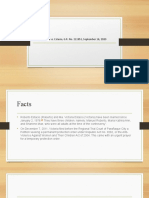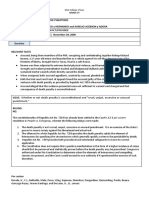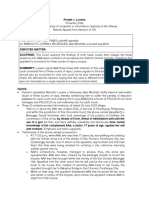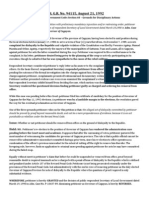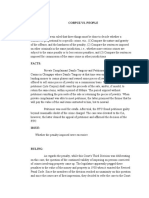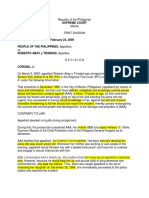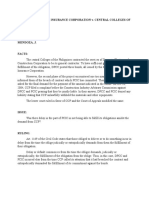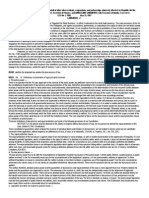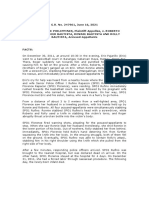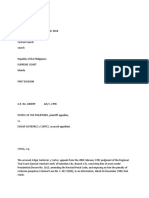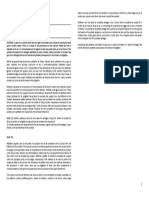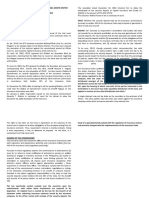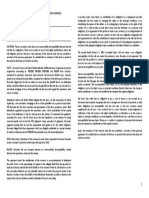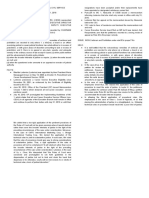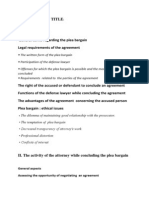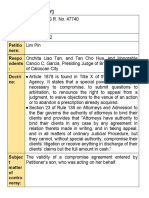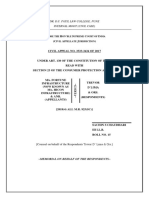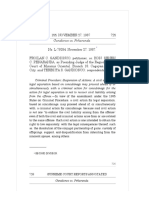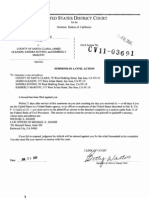1 Dimakuta v. People
1 Dimakuta v. People
Uploaded by
Mark Evan GarciaOriginal Description:
Copyright
Available Formats
Share this document
Did you find this document useful?
Is this content inappropriate?
Report this DocumentCopyright:
Available Formats
1 Dimakuta v. People
1 Dimakuta v. People
Uploaded by
Mark Evan GarciaCopyright:
Available Formats
#01 DIMAKUTA V.
PEOPLE stating that Colineras does not apply because petitioner put in issue on
(G.R. No. 206513 / 20 October 2015) appeal the merits of their conviction and did not simply assail the
By: AMBE propriety of the penalties imposed. CA applied the ruling in Lagrosa v.
People instead.
Topic: Probation Law ISSUE: Can petitioner avail the benefits of Probation Law even if an
Petitioner: MUSTAPHA DIMAKUTA MARUHOM appeal has already been perfected?
Respondent: PEOPLE OF THE PHIILPPINES
Ponente: PERALTA, J. RULING: No.
Section 4 of the Probation Law provides that the application for
FACTS: Petitioner Dimakuta alias Boyet was indicted for Violation of probation must be filed with the trial court within the 15-day period for
Section 5 Paragraph (b), Article III of Republic Act (R.A.) No. 7610 or the perfecting an appeal. The need to file it within such period is intended to
Special Protection of Children Against Abuse, Exploitation and encourage offenders, who are willing to be reformed and rehabilitated,
Discriminatory Act. He committed a lascivious conduct upon the person to avail themselves of probation at the first opportunity. If the
of AAA, who was a sixteen (16) year old minor, embracing her, touching application for probation is filed beyond the 15-day period, then the
her breast and private part against her will and without her consent. judgment becomes final and executory and the lower court can no longer
act on the application for probation. On the other hand, if a notice of
RTC convicted petitioner of the crime charged and sentenced him to appeal is perfected, the trial court that rendered the judgment of
suffer an indeterminate penalty of imprisonment ranging from ten (10) conviction is divested of any jurisdiction to act on the case, except the
years of prision mayor, as minimum, to seventeen (17) years, four (4) execution of the judgment when it has become final and executory.
months and one (1) day of reclusion temporal.
If this Court will adopt as jurisprudential doctrine the opinion that
Petitioner appealed to CA arguing that even assuming he an accused may still be allowed to apply for probation even if he
committed the acts imputed, still there is no evidence showing that has filed a notice of appeal, it must be categorically stated that such
the same were done without the victim’s consent or through force, appeal must be limited to the following grounds:
duress, intimidation or violence upon her. OSG opined that petitioner
should have been convicted only of Acts of Lasciviousness under Article 1. When the appeal is merely intended for the correction of the
336 of the Revised Penal Code (RPC) in view of the prosecution’s failure penalty imposed by the lower court, which when corrected would
to establish that the lascivious acts were attended by force or coercion entitle the accused to apply for probation; and
because the victim was asleep at the time the alleged acts were
committed. 2. When the appeal is merely intended to review the crime for which the
accused was convicted and that the accused should only be liable to the
CA adopted OSG’s recommendation and found petitioner guilty of Acts of lesser offense which is necessarily included in the crime for which he
Lasciviousness under Article 336 of the RPC and was sentenced to suffer was originally convicted and the proper penalty imposable is within the
the indeterminate penalty of six (6) months of arresto mayor, as probationable period.
minimum, to four (4) years and two (2) months of prision correccional,
as maximum. In addition, before an appeal is filed based on the grounds enumerated
above, the accused should first file a motion for reconsideration of the
Petitioner filed a motion before the CA to allow him to apply for decision of the trial court anchored on the above-stated grounds and
probation upon remand of the case to the RTC. CA denied his motion manifest his intent to apply for probation if the motion is granted. The
motion for reconsideration will give the trial court an opportunity to imposed by the trial court. Allowing the afore-stated grounds for appeal
review and rectify any errors in its judgment, while the manifestation of would give an accused the opportunity to apply for probation if his
the accused will immediately show that he is agreeable to the judgment ground for appeal is found to be meritorious by the appellate court, thus,
of conviction and does not intend to appeal from it, but he only seeks a serving the purpose of the Probation Law to promote the reformation of
review of the crime and/or penalty imposed, so that in the event that the a penitent offender outside of prison.
penalty will be modified within the probationable limit, he will
immediately apply for probation. Without such motion for In this case, petitioner appealed the trial court's judgment of
reconsideration, the notice of appeal should be denied outright. conviction before the CA alleging that it was error on the part of the
RTC to have found him guilty of violating Section 5(b), Article III of
The notice of appeal should contain the following averments: R.A. No. 7610. He argued that the RTC should not have given much faith
and credence to the testimony of the victim because it was tainted with
(1) that an earlier motion for reconsideration was filed but was denied inconsistencies. Moreover, he went on to assert that even assuming he
by the trial court; committed the acts imputed on him, still there was no evidence showing
that the lascivious acts were committed without consent or through
(2) that the appeal is only for reviewing the penalty imposed by the force, duress, intimidation or violence because the victim at that time
lower court or the conviction should only be for a lesser crime was in deep slumber. It is apparent that petitioner anchored his
necessarily included in the crime charged in the information; and appeal on a claim of innocence and/or lack of sufficient evidence to
support his conviction of the offense charged, which is clearly
(3) that the accused-appellant is not seeking acquittal of the conviction. inconsistent with the tenor of the Probation Law that only qualified
penitent offender are allowed to apply for probation. The CA, therefore,
What Section 4 of the Probation Law prohibits is an appeal from the did not err in applying the similar case of Lagrosa v. People wherein the
judgment of conviction, which involves a review of the merits of the protestations of petitioners therein did not simply assail the propriety of
case and the determination of whether the accused is entitled to the penalties imposed but meant a profession of guiltlessness, if not
acquittal. However, under the recommended grounds for appeal which complete innocence.
were enumerated earlier, the purpose of the appeal is not to assail the
judgment of conviction but to question only the propriety of the To be sure, if petitioner intended in the first instance to be entitled
sentence, particularly the penalty imposed or the crime for which the to apply for probation he should have admitted his guilt and
accused was convicted, as the accused intends to apply for probation buttressed his appeal on a claim that the penalty imposed by the
upon correction of the penalty or conviction for the lesser offense. If the RTC was erroneous or that he is only guilty of a lesser offense
CA finds it proper to modify the sentence, and the penalty finally necessarily included in the crime for which he was originally convicted.
imposed by the appellate court is within the probationable period, or the Unfortunately for him, he already perfected his appeal and it is late in
crime for which the accused is eventually convicted imposes a the day to avail the benefits of probation despite the imposition of the CA
probationable penalty, application for probation after the case is of a probationable penalty.
remanded to the trial court for execution should be allowed.
It is believed that the recommended grounds for appeal do not
contravene Section 4 of the Probation Law, which expressly prohibits
only an appeal from the judgment of conviction. In such instances, the
ultimate reason of the accused for filing the appeal based on the afore-
stated grounds is to determine whether he may avail of probation based
on the review by the appellate court of the crime and/or penalty
You might also like
- Cite A Recent or Current Event in The Philippines or in The World Where The Rule of Law Prevailed and How This Affected That Society or CommunityDocument2 pagesCite A Recent or Current Event in The Philippines or in The World Where The Rule of Law Prevailed and How This Affected That Society or Communityhalapatry100% (1)
- RULE 74 (Sec. 1) : Settlement of Estate of A Deceased PersonDocument2 pagesRULE 74 (Sec. 1) : Settlement of Estate of A Deceased PersonChristianne Joyse Merrera80% (5)
- Estacio Vs EstacioDocument14 pagesEstacio Vs EstacioWilfredo100% (2)
- Probation Law Digested CasesDocument15 pagesProbation Law Digested CasesNin Ja100% (27)
- Santiago v. Garcia + Garcia CLR II G01 DLSUDocument1 pageSantiago v. Garcia + Garcia CLR II G01 DLSUMark Evan Garcia50% (2)
- Death Penalty:: Latin CiceroDocument3 pagesDeath Penalty:: Latin CiceroMark Evan GarciaNoch keine Bewertungen
- Quiz No. 5 On Graduation of Penalties and The Indeterminate Sentence LawDocument3 pagesQuiz No. 5 On Graduation of Penalties and The Indeterminate Sentence LawAllen SoNoch keine Bewertungen
- People Vs Mercado Case DigestDocument1 pagePeople Vs Mercado Case DigestAphr100% (1)
- Conniving, Conspiring and Confederating With One Another, Did Then andDocument2 pagesConniving, Conspiring and Confederating With One Another, Did Then andMaverick Jann Esteban100% (2)
- People v. Lucena DigestDocument3 pagesPeople v. Lucena DigestLuis PerezNoch keine Bewertungen
- 18 People V JalosjosDocument2 pages18 People V JalosjosdoraemoanNoch keine Bewertungen
- Digest - Aguinaldo vs. SantosDocument1 pageDigest - Aguinaldo vs. SantosPaul Vincent Cunanan100% (2)
- RULE 122 - Dimakuta v. PeopleDocument3 pagesRULE 122 - Dimakuta v. Peoplebeaenriquez100% (1)
- CORPUZ VS People Case DigestDocument2 pagesCORPUZ VS People Case DigestKayee Kat100% (2)
- People V MacbulDocument2 pagesPeople V MacbulDomski Fatima Candolita100% (1)
- People v. Tulagan (2019) Case BriefDocument9 pagesPeople v. Tulagan (2019) Case BriefPaulo Salanguit100% (1)
- People v. Genosa GR No. 135981Document2 pagesPeople v. Genosa GR No. 135981KIM COLLEEN MIRABUENA100% (2)
- G.R. Nos. 138874-75Document1 pageG.R. Nos. 138874-75Abby100% (1)
- SPL Digest - People Vs LopezDocument2 pagesSPL Digest - People Vs LopezYanilyAnnVldz50% (2)
- People vs. Walpan Ladjaalam y Milapil - RA 8294Document1 pagePeople vs. Walpan Ladjaalam y Milapil - RA 8294Ena EloisaNoch keine Bewertungen
- Zaldivia vs. ReyesDocument2 pagesZaldivia vs. ReyesBert NazarioNoch keine Bewertungen
- Rule 122 - AppealDocument4 pagesRule 122 - AppealNivra Lyn EmpialesNoch keine Bewertungen
- People Vs Abay CaseDocument6 pagesPeople Vs Abay Casepatricia.aniyaNoch keine Bewertungen
- Aggravating Circumstances DWELLINGDocument3 pagesAggravating Circumstances DWELLINGSur ReyNoch keine Bewertungen
- People V Genosa - Case Digest (Justifying Circumstances - Defense of Self, Relatives and Strangers)Document3 pagesPeople V Genosa - Case Digest (Justifying Circumstances - Defense of Self, Relatives and Strangers)Maria Angela Gaspar100% (2)
- 1 People v. Abarca Case DigestDocument3 pages1 People v. Abarca Case DigestCedrick0% (1)
- Soriano V CA DigestDocument2 pagesSoriano V CA DigestMary Louise R. Concepcion75% (4)
- People V SaleyDocument2 pagesPeople V SaleyNico Nuñez50% (2)
- PEOPLE OF THE PHILIPPINES vs. VIRGILIO RIMORINDocument2 pagesPEOPLE OF THE PHILIPPINES vs. VIRGILIO RIMORINSERVICES SUBNoch keine Bewertungen
- Carlos Paulo Bartolome y Ilagan Et Al V People of The PhilDocument1 pageCarlos Paulo Bartolome y Ilagan Et Al V People of The PhilAlexir MendozaNoch keine Bewertungen
- 49 - Consti2-G.R. No. L-68955 P V Burgos - DigestDocument4 pages49 - Consti2-G.R. No. L-68955 P V Burgos - DigestOjie SantillanNoch keine Bewertungen
- Case Digest People Vs Abarca DownloadDocument2 pagesCase Digest People Vs Abarca Downloadgohanks_m693667% (12)
- PHILIPPINE CHARTER INSURANCE CORPORATION V CCPDocument1 pagePHILIPPINE CHARTER INSURANCE CORPORATION V CCPbantucin davooNoch keine Bewertungen
- 01 1PEOPLE OF THE PHILIPPINES v. PO3 ARMANDO DALAG y CUSTODIODocument2 pages01 1PEOPLE OF THE PHILIPPINES v. PO3 ARMANDO DALAG y CUSTODIOKreizel BojeroNoch keine Bewertungen
- Duplicity of The OffenseDocument5 pagesDuplicity of The OffenseArlene Q. SamanteNoch keine Bewertungen
- PEOPLE OF THE PHILIPPINES v. ANASTACIO AMISTOSO y BROCADocument2 pagesPEOPLE OF THE PHILIPPINES v. ANASTACIO AMISTOSO y BROCA楊瑪莉Noch keine Bewertungen
- Erap Case DigestDocument5 pagesErap Case DigestJed AdrianNoch keine Bewertungen
- People v. AgaoDocument32 pagesPeople v. AgaoLance LagmanNoch keine Bewertungen
- Exempting Circumstances Gude QuestionsDocument14 pagesExempting Circumstances Gude QuestionsKE NTNoch keine Bewertungen
- People of The Philippines, Plaintiff-Appellee, vs. Lito Paming y Javier, Accused-AppellantDocument8 pagesPeople of The Philippines, Plaintiff-Appellee, vs. Lito Paming y Javier, Accused-Appellantkristel jane caldozaNoch keine Bewertungen
- Napoles Case DigestDocument2 pagesNapoles Case Digesteucj100% (6)
- 01 GR No. 128096 - Final DigestedDocument2 pages01 GR No. 128096 - Final DigestedKishalyn Dao-ines100% (2)
- Johnny Garcia Yap Versus People of The PhilippinesDocument2 pagesJohnny Garcia Yap Versus People of The PhilippinesCrystal MatibayNoch keine Bewertungen
- People V Tulagan DigestDocument4 pagesPeople V Tulagan DigestHannah Sy100% (3)
- Anti-Fencing Law (PD 1612)Document3 pagesAnti-Fencing Law (PD 1612)Gil Paterno G. MendozaNoch keine Bewertungen
- Due Process Equal ProtectionDocument72 pagesDue Process Equal ProtectionMalen Roque SaludesNoch keine Bewertungen
- Budlong vs. ApalisokDocument2 pagesBudlong vs. ApalisokAthina Maricar Cabase100% (1)
- People vs. Romy Lim DigestDocument4 pagesPeople vs. Romy Lim DigestEmir Mendoza80% (5)
- Rule 122Document3 pagesRule 122deveraux_07Noch keine Bewertungen
- Napoles DigestDocument3 pagesNapoles DigestCharlie Sheen ConcepcionNoch keine Bewertungen
- People vs. Sumili Presumption of Innocence in Drugs CasesDocument5 pagesPeople vs. Sumili Presumption of Innocence in Drugs CasesChaNoch keine Bewertungen
- Criminal Law - People-V-SarabiaDocument3 pagesCriminal Law - People-V-SarabiaAmmie AsturiasNoch keine Bewertungen
- Fernand Jr. V People GR No. 145927Document2 pagesFernand Jr. V People GR No. 145927Duko Alcala EnjambreNoch keine Bewertungen
- People v. Gonzales, 73 Phil. 549 FactsDocument39 pagesPeople v. Gonzales, 73 Phil. 549 FactsDiane JulianNoch keine Bewertungen
- Peñalosa vs. OcampoDocument3 pagesPeñalosa vs. OcampoKatrina Kate RanesesNoch keine Bewertungen
- People Vs Tubongbanua (LUMIO)Document2 pagesPeople Vs Tubongbanua (LUMIO)quasideliksNoch keine Bewertungen
- People of The Philippines Vs Roberto BautistaDocument3 pagesPeople of The Philippines Vs Roberto BautistaMichelle MasalonNoch keine Bewertungen
- Case No. 17 PEOPLE OF THE PHILIPPINES v. ROLANDO CENTENODocument1 pageCase No. 17 PEOPLE OF THE PHILIPPINES v. ROLANDO CENTENOCarmel Grace KiwasNoch keine Bewertungen
- People Vs GutierrezDocument8 pagesPeople Vs GutierrezJayson AbabaNoch keine Bewertungen
- Application of Revised Penal Code in Special LawsDocument2 pagesApplication of Revised Penal Code in Special LawsRace Patam Ki100% (2)
- Criminal Law People V. SolarDocument2 pagesCriminal Law People V. SolarAiza Lantud100% (2)
- Dimakuta v. PeopleDocument2 pagesDimakuta v. PeopleNico NuñezNoch keine Bewertungen
- CJDMPeralta - ProbationDocument5 pagesCJDMPeralta - ProbationhlcameroNoch keine Bewertungen
- Facts:: MUSTAPHA DIMAKUTA Y MARUHOM v. PEOPLE, GR No. 206513, 2015-10-20Document2 pagesFacts:: MUSTAPHA DIMAKUTA Y MARUHOM v. PEOPLE, GR No. 206513, 2015-10-20Leonard GarciaNoch keine Bewertungen
- ADMIN PUB OFFICE ELECTION SyllabusDocument17 pagesADMIN PUB OFFICE ELECTION SyllabusMark Evan GarciaNoch keine Bewertungen
- Compiled Consti DigestDocument58 pagesCompiled Consti DigestMark Evan GarciaNoch keine Bewertungen
- Bartolome v. IACDocument3 pagesBartolome v. IACMark Evan GarciaNoch keine Bewertungen
- Bartolome v. IACDocument3 pagesBartolome v. IACMark Evan GarciaNoch keine Bewertungen
- Evid VDocument136 pagesEvid VMark Evan GarciaNoch keine Bewertungen
- 2020 BOC Labor Law Reviewer PDFDocument269 pages2020 BOC Labor Law Reviewer PDFMark Evan GarciaNoch keine Bewertungen
- R.S. Tomas, Inc v. Rizal Cement Company IncDocument1 pageR.S. Tomas, Inc v. Rizal Cement Company IncMark Evan Garcia100% (1)
- 267 Mendoza v. Spouses ArmandoDocument1 page267 Mendoza v. Spouses ArmandoMark Evan GarciaNoch keine Bewertungen
- Evid IvDocument15 pagesEvid IvMark Evan GarciaNoch keine Bewertungen
- Soco v. MilitanteDocument2 pagesSoco v. MilitanteMark Evan GarciaNoch keine Bewertungen
- Tolentino v. Spouses LataganDocument1 pageTolentino v. Spouses LataganMark Evan GarciaNoch keine Bewertungen
- R.S. Tomas, Inc v. Rizal Cement Company IncDocument1 pageR.S. Tomas, Inc v. Rizal Cement Company IncMark Evan GarciaNoch keine Bewertungen
- 178 Land Bank of The Philippines v. RamosDocument2 pages178 Land Bank of The Philippines v. RamosMark Evan Garcia100% (1)
- Capitol Insurance V Del Monte MotorsDocument2 pagesCapitol Insurance V Del Monte MotorsMark Evan GarciaNoch keine Bewertungen
- 246 Heirs of Soliva v. SolivaDocument1 page246 Heirs of Soliva v. SolivaMark Evan GarciaNoch keine Bewertungen
- Heirs of Franco v. Spouses Gonzales Garcia CLR II G01 DLSUDocument1 pageHeirs of Franco v. Spouses Gonzales Garcia CLR II G01 DLSUMark Evan GarciaNoch keine Bewertungen
- 82 Ren Transport v. NLRCDocument2 pages82 Ren Transport v. NLRCMark Evan GarciaNoch keine Bewertungen
- Communication and Informaton Systems Corporation v. Mark Sensing Australia Pty. LTDDocument2 pagesCommunication and Informaton Systems Corporation v. Mark Sensing Australia Pty. LTDMark Evan GarciaNoch keine Bewertungen
- #66 IN RE - PETITION FOR ADOPTION OF JAN AUREL BULAYO GARCIA, Mark Evan G01DLSU Week 5Document1 page#66 IN RE - PETITION FOR ADOPTION OF JAN AUREL BULAYO GARCIA, Mark Evan G01DLSU Week 5Mark Evan Garcia100% (1)
- #5 Career Executive Service Board Vs Civil Service CommissionDocument2 pages#5 Career Executive Service Board Vs Civil Service CommissionMark Evan GarciaNoch keine Bewertungen
- #6 Arriola v. Arriola GARCIA, Mark Evan G01DLSU Week 5Document2 pages#6 Arriola v. Arriola GARCIA, Mark Evan G01DLSU Week 5Mark Evan GarciaNoch keine Bewertungen
- 144 Banco Filipino v. CamposDocument2 pages144 Banco Filipino v. CamposMark Evan GarciaNoch keine Bewertungen
- Acordul de Recunoastere A Vinovatiei (Tradus)Document7 pagesAcordul de Recunoastere A Vinovatiei (Tradus)Oleg AndreevNoch keine Bewertungen
- MFQ Remedial Law 2024Document16 pagesMFQ Remedial Law 2024noelIV T. borromeoNoch keine Bewertungen
- 47 Barcellano v. Bañas GR No. 165287 September 14, 2011Document6 pages47 Barcellano v. Bañas GR No. 165287 September 14, 2011RexNoch keine Bewertungen
- Nseera v. Ashcroft, 10th Cir. (2005)Document9 pagesNseera v. Ashcroft, 10th Cir. (2005)Scribd Government DocsNoch keine Bewertungen
- 02 21 17-CasesDocument98 pages02 21 17-Caseskim bok jooNoch keine Bewertungen
- Rasmussen Apellate Cout DecisionDocument14 pagesRasmussen Apellate Cout DecisionBetsy A. RossNoch keine Bewertungen
- Crim Pro DigestsDocument11 pagesCrim Pro DigestsNikki SiaNoch keine Bewertungen
- Andrews v. City of Mentor, No. 20-4030 (6th Cir. Aug. 25, 2021)Document26 pagesAndrews v. City of Mentor, No. 20-4030 (6th Cir. Aug. 25, 2021)RHTNoch keine Bewertungen
- In The High Court of The Hong Kong Special Administrative Region Court of First InstanceDocument18 pagesIn The High Court of The Hong Kong Special Administrative Region Court of First InstancehNoch keine Bewertungen
- Medcalf v. Dewalt Et Al - Document No. 4Document2 pagesMedcalf v. Dewalt Et Al - Document No. 4Justia.comNoch keine Bewertungen
- Applicability of Limitation Act On Arbitration ProceedingsDocument2 pagesApplicability of Limitation Act On Arbitration ProceedingsAnshuman Tiwari SaryuparinNoch keine Bewertungen
- Luna v. Plaza, 26 SCRA 310 DigestDocument1 pageLuna v. Plaza, 26 SCRA 310 DigestAlvin Earl NuydaNoch keine Bewertungen
- Rule 122 - PERSONAL COLLECTION DIRECT SELLING, INC - vs.TERESITA L. CARANDANGDocument4 pagesRule 122 - PERSONAL COLLECTION DIRECT SELLING, INC - vs.TERESITA L. CARANDANGbergs daotNoch keine Bewertungen
- United States v. Bruce Talley, 4th Cir. (2015)Document5 pagesUnited States v. Bruce Talley, 4th Cir. (2015)Scribd Government DocsNoch keine Bewertungen
- Mohammed Jammeh, A205 274 106 (BIA Feb. 23, 2015)Document6 pagesMohammed Jammeh, A205 274 106 (BIA Feb. 23, 2015)Immigrant & Refugee Appellate Center, LLCNoch keine Bewertungen
- Socorro Vs WilsemDocument4 pagesSocorro Vs WilsemMercy Dema-alaNoch keine Bewertungen
- Blake Anderson ResponseDocument30 pagesBlake Anderson ResponseCourtneyNoch keine Bewertungen
- (Kinds of Agency) Case Citatio N: Date: Petitio Ners: Respo Ndents: Doctri NeDocument8 pages(Kinds of Agency) Case Citatio N: Date: Petitio Ners: Respo Ndents: Doctri NeCarie LawyerrNoch keine Bewertungen
- Zoleta Vs SandiganbayanDocument4 pagesZoleta Vs SandiganbayanKent Ugalde100% (3)
- People vs. DelgadoDocument1 pagePeople vs. DelgadoLylo BesaresNoch keine Bewertungen
- Columbia v. Seirus - Petition For Panel RehearingDocument57 pagesColumbia v. Seirus - Petition For Panel RehearingSarah BursteinNoch keine Bewertungen
- Imgs CaesarDocument13 pagesImgs CaesaranjhaankitNoch keine Bewertungen
- Civil Procedure Code (English)Document232 pagesCivil Procedure Code (English)Osmar Alves BocciNoch keine Bewertungen
- Cases Batch 5 Evidence Case DigestDocument8 pagesCases Batch 5 Evidence Case DigestPfizer Chan BangisNoch keine Bewertungen
- Final - Respondent MemorialDocument16 pagesFinal - Respondent MemorialsimranNoch keine Bewertungen
- 7 Gandionco vs. PenarandaDocument9 pages7 Gandionco vs. PenarandaRaiya AngelaNoch keine Bewertungen
- Summons and ComplaintDocument20 pagesSummons and ComplaintHosetta ZertucheNoch keine Bewertungen
- United States v. Georgia Waste Systems, Inc. and Raymond E. Dinkle, 731 F.2d 1580, 11th Cir. (1984)Document5 pagesUnited States v. Georgia Waste Systems, Inc. and Raymond E. Dinkle, 731 F.2d 1580, 11th Cir. (1984)Scribd Government DocsNoch keine Bewertungen


